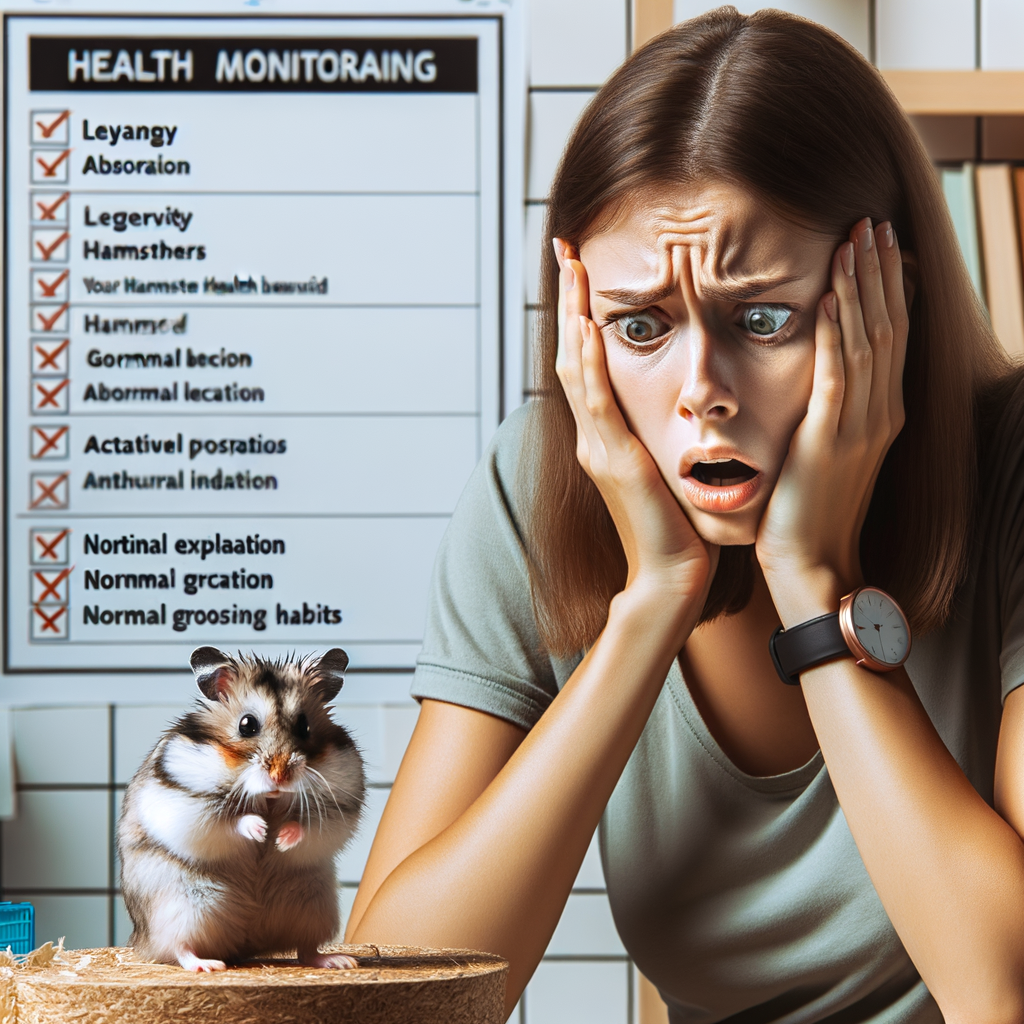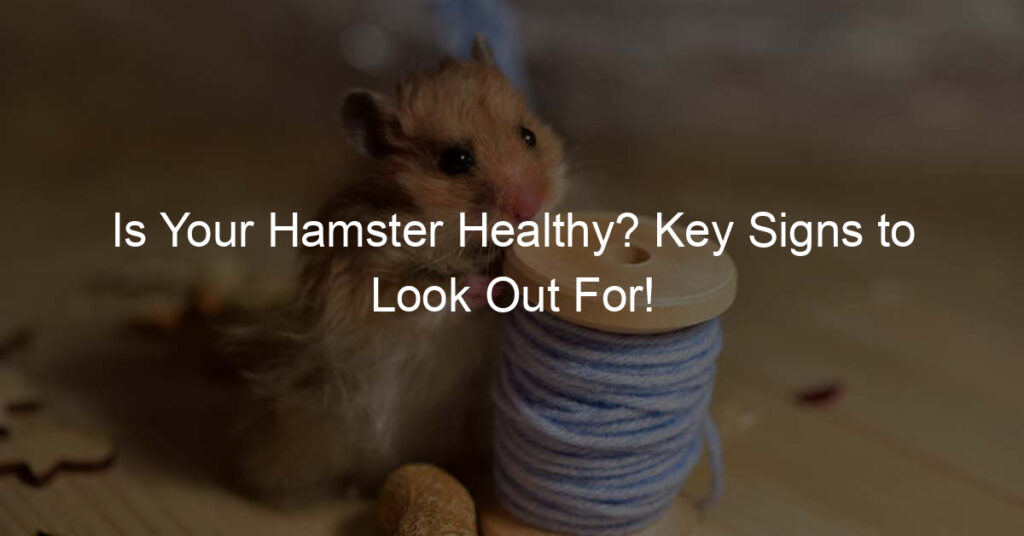
Introduction to Hamster Health
Hamsters are adorable and delightful pets that bring joy to our lives. However, like any other pet, they require proper care and attention to maintain their health. This article will explore the importance of monitoring your hamster’s health and delve into the specifics of hamster health.
- Importance of Monitoring Pet Health
- Specifics of Hamster Health
Monitoring your pet’s health is crucial for their well-being. Regular health checks can help detect any potential issues early, allowing for timely treatment and prevention of further complications. This is particularly important for hamsters, as they are small creatures and can quickly become seriously ill if health issues are not addressed promptly.
Hamster health is a unique area that requires specific knowledge and understanding. Hamsters have different health needs compared to other pets. They are prone to certain diseases and conditions, such as wet tail, respiratory infections, and hamster diabetes. Understanding these specifics is key to providing the best care for your hamster.
Throughout this article, we will delve deeper into the world of hamster health, discussing how to understand hamster care, signs of a healthy and sick hamster, how to monitor hamster health, and case studies of hamster health issues. By the end, you should be well-equipped to ensure your hamster’s health and happiness.
Understanding Hamster Care
Hamsters are adorable, small pets that require specific care to ensure they live a happy and healthy life. In this section, we will cover the basics of pet hamster care, including proper feeding, appropriate habitat, and regular exercise.
Basic Pet Hamster Care
Understanding the basics of hamster care is crucial for any hamster owner. Here are three key areas to focus on:
- Proper feeding: Hamsters are omnivores, meaning they eat both plants and meat. A balanced diet for a hamster typically includes commercial hamster food, fresh fruits and vegetables, and occasional protein sources like boiled eggs or cooked chicken. It’s important to avoid overfeeding your hamster and to provide fresh water daily.
- Appropriate habitat: Hamsters need a clean, spacious cage with plenty of room to move around. The cage should include a quiet, dark area for sleeping, and it should be kept at a consistent temperature, away from direct sunlight and drafts. The cage should also contain bedding for burrowing and a nesting area.
- Regular exercise: Hamsters are active creatures, especially at night. Providing an exercise wheel in their cage is essential for their physical health. You can also let your hamster explore a safe, hamster-proofed room under your supervision for extra exercise.
By ensuring proper feeding, an appropriate habitat, and regular exercise, you can help your hamster lead a healthy and happy life. Remember, every hamster is unique and may have different needs, so it’s important to observe your pet and adjust their care as needed.
Advanced Pet Hamster Care
As a hamster owner, it’s important to understand that your pet’s health goes beyond basic care. Advanced pet hamster care involves more detailed and specialized attention. Let’s delve into two key aspects of advanced hamster care.
- Regular Vet Check-ups
Just like humans, hamsters also need regular health check-ups. These visits to the vet can help detect any potential health issues early, increasing the chances of successful treatment. It’s recommended to take your hamster to the vet at least once a year for a general check-up.
During these visits, the vet will typically examine your hamster’s teeth, fur, and weight. They may also listen to your hamster’s heart and lungs to ensure they are functioning properly. Remember, early detection of health issues can save your hamster’s life.
- Understanding Hamster Behavior
Understanding your hamster’s behavior is another crucial aspect of advanced care. Hamsters have unique behaviors that can tell you a lot about their health and happiness. For instance, a healthy hamster is usually active, especially at night, and has a good appetite.
On the other hand, changes in behavior such as lethargy, loss of appetite, or unusual aggression can be signs of stress or illness. Therefore, it’s important to spend time with your hamster and observe its behavior regularly. This way, you can quickly notice any changes and seek veterinary help if needed.
In conclusion, advanced pet hamster care involves regular vet check-ups and understanding your hamster’s behavior. By paying attention to these aspects, you can ensure your hamster lives a long, healthy, and happy life.
Signs of a Healthy Hamster
Knowing the signs of a healthy hamster is essential for any hamster owner. It helps you ensure that your pet is in good shape and can alert you to any potential health issues before they become severe. Here are some key indicators to look out for:
- Active and Alert
- Healthy Coat
- Regular Eating Habits
An active and alert hamster is a healthy hamster. These little creatures are naturally curious and love to explore their surroundings. If your hamster is active, it’s a good sign that they’re feeling well. They should respond to your presence and show interest in their environment. A lethargic hamster, on the other hand, could be a sign of illness.
A healthy hamster will have a clean, shiny coat. The fur should be smooth and free from bald patches or signs of parasites, like mites. If your hamster’s coat is looking dull, it might be a sign that they’re not getting the right nutrients or that they’re feeling unwell.
Hamsters are known for their love of food. A healthy hamster will have regular eating habits. They should be interested in their food and eat it without difficulty. If your hamster is not eating as much as usual, or if they’re having trouble eating, it could be a sign of dental problems or other health issues.
Remember, these are just guidelines. Every hamster is unique and may show different signs of health. If you’re ever unsure about your hamster’s health, it’s always best to consult with a vet.
Signs of a Sick Hamster
Just like humans, hamsters can also fall ill. It’s crucial to recognize the signs of a sick hamster early to provide them with the necessary care and treatment. Let’s explore some common health issues that hamsters often face.
Common Hamster Health Issues
Hamsters are susceptible to a variety of health issues. Here are a few common ones:
- Wet Tail: Wet tail is a severe diarrheal disease often seen in hamsters, especially in babies and those under stress. It’s characterized by a wet and dirty area around the tail due to diarrhea. If left untreated, it can be fatal.
- Respiratory Issues: Hamsters can suffer from respiratory diseases like pneumonia, cold, or bronchitis. Common signs include difficulty breathing, nasal discharge, and frequent sneezing.
- Overgrown Teeth: Hamsters’ teeth never stop growing, and if they don’t grind them down by gnawing on hard materials, they can become overgrown. This can lead to eating difficulties and weight loss.
These are just a few examples of health issues that can affect your hamster. Always keep an eye on your pet’s behavior and appearance, and consult a vet if you notice anything unusual.
Unusual Hamster Symptoms
While common health issues in hamsters like wet tail, respiratory issues, and overgrown teeth are well-known, there are also some unusual symptoms that may indicate your furry friend is not feeling well. These symptoms might not be as obvious, but they are equally important to notice for the health and wellbeing of your hamster.
- Lethargy
- Loss of Appetite
- Unusual Behavior
Hamsters are naturally active and curious creatures. If you notice your hamster is sleeping more than usual or showing a lack of interest in activities it usually enjoys, it might be a sign of illness. Lethargy can be a symptom of various health problems, including infection, heart disease, or even stress.
Hamsters love to eat. If your hamster is eating less than usual or not eating at all, it’s a cause for concern. Loss of appetite can be a sign of dental problems, digestive issues, or other health conditions. It’s important to monitor your hamster’s eating habits closely and consult a vet if you notice any changes.
As a hamster owner, you’re likely familiar with your pet’s usual behavior. Any sudden changes in behavior can be a sign of illness. This could include aggression, excessive grooming, or changes in their toilet habits. Always keep an eye on your hamster’s behavior and seek professional help if you notice anything unusual.
Remember, these symptoms might not always mean your hamster is sick. However, it’s always better to be safe than sorry. If your hamster is showing any of these symptoms, it’s best to consult a vet immediately.
| Symptom | Possible Causes |
|---|---|
| Lethargy | Infection, heart disease, stress |
| Loss of Appetite | Dental problems, digestive issues |
| Unusual Behavior | Stress, illness |
Knowing these unusual symptoms and their possible causes can help you ensure your hamster’s health and happiness. Always remember, a healthy hamster is a happy hamster!
How to Monitor Hamster Health
Keeping your hamster healthy is a top priority. There are three key methods to monitor your hamster’s health: regular observation, understanding normal behavior, and regular vet visits. Let’s delve into each of these methods.
- Regular Observation
Observing your hamster on a daily basis is crucial. This doesn’t mean just watching them play, but also checking for any changes in their physical appearance or behavior. Look for signs of weight loss, changes in fur condition, or unusual behavior. If you notice anything out of the ordinary, it could be a sign of illness.
- Understanding Normal Behavior
Knowing what is normal for your hamster is key to spotting when something is wrong. Hamsters are nocturnal, so they should be active at night and sleep during the day. They love to run, climb, and explore. If your hamster is sleeping more than usual or not showing interest in their usual activities, it may be a sign of illness.
- Regular Vet Visits
Just like humans, hamsters need regular check-ups too. A vet can spot health issues that may not be visible to the naked eye. It’s recommended to take your hamster to the vet at least once a year for a general check-up. If your hamster is older or has health issues, more frequent visits may be necessary.
In conclusion, monitoring your hamster’s health involves a combination of regular observation, understanding their normal behavior, and scheduling regular vet visits. By doing so, you can ensure your hamster lives a long, healthy, and happy life.
Case Studies: Hamster Health Issues
Understanding hamster health is essential to ensure their well-being. Let’s delve into some case studies to gain a deeper understanding of common hamster health issues.
Case Study 1: Wet Tail
Wet Tail is a common health issue among hamsters, particularly in young ones. It’s a severe form of diarrhea that can be fatal if not treated promptly.
- Symptoms:
- Treatment:
- Outcome:
Wet Tail symptoms include a wet and soiled area around the tail, loss of appetite, lethargy, and a hunched posture. The hamster may also appear dehydrated and show signs of distress.
Treatment for Wet Tail involves a course of antibiotics prescribed by a vet. It’s crucial to keep the hamster hydrated and comfortable during this period. The cage should be kept clean to prevent further infection.
With prompt treatment, the hamster can recover from Wet Tail within a week. However, it’s essential to monitor the hamster closely for any signs of relapse.
Understanding and recognizing the symptoms of Wet Tail can help in early detection and treatment, improving the chances of your hamster’s recovery. Always remember, when in doubt, consult with a vet.
Case Study 2: Respiratory Issues
Respiratory issues are a common health problem in hamsters. Let’s explore a case study to understand the symptoms, treatment, and outcome of this health issue.
- Symptoms
- Treatment
- Outcome
Hamsters with respiratory issues often show signs like frequent sneezing, difficulty in breathing, and a runny nose. They may also have watery eyes and a lack of energy. In severe cases, you may notice a change in their eating habits or a loss of weight.
Treatment for respiratory issues in hamsters usually involves a course of antibiotics prescribed by a vet. It’s important to keep the hamster’s living area clean and dry to prevent further infection. Providing a warm and comfortable environment can also help in recovery.
With timely treatment, most hamsters recover from respiratory issues. However, if left untreated, it can lead to serious complications. Therefore, it’s crucial to monitor your hamster’s health regularly and seek professional help if you notice any signs of illness.
| Health Issue | Symptoms | Treatment | Outcome |
|---|---|---|---|
| Respiratory Issues | Frequent sneezing, difficulty in breathing, runny nose, watery eyes, lack of energy, change in eating habits, weight loss | Course of antibiotics, clean and dry living area, warm and comfortable environment | Recovery with timely treatment, possible complications if left untreated |
In conclusion, respiratory issues in hamsters can be serious but are treatable with the right care and attention. Always keep an eye on your pet’s behavior and health, and consult a vet if you notice anything unusual.
Conclusion: Ensuring Your Hamster’s Health
As we wrap up our discussion on hamster health, it’s crucial to remember that the wellbeing of your furry friend is largely dependent on the care and attention you provide. Let’s recap some of the key points we’ve covered.
- Key takeaways:
- Importance of vigilance:
- Resources for further reading:
Understanding your hamster’s needs, recognizing signs of good health and potential illness, and knowing how to monitor their health are all essential aspects of hamster care. Regular vet check-ups and a balanced diet are also crucial for their wellbeing.
Keeping a close eye on your hamster’s behavior and physical condition is vital. Changes in their eating habits, activity levels, or appearance can be early signs of health issues. Early detection can make a significant difference in the treatment and recovery process.
While this guide provides a good starting point, it’s always beneficial to continue learning about hamster health. Books on hamster care, vet advice, and reputable online resources can provide valuable information to help you ensure your hamster lives a long, healthy life.
In conclusion, your hamster’s health is a responsibility that should be taken seriously. By being vigilant and proactive, you can ensure your little friend stays happy and healthy for years to come. Remember, a healthy hamster is a happy hamster!








